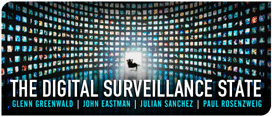In another post, I’ll talk about some of the things that Glenn and Julian have said that I actually agree with. In this short first post, however, I want to continue the stylized disagreement.
Julian writes: “More disturbing than the quantitative increase in surveillance Glenn documents — and it is disturbing, when we consider that the sheer number of National Security Letters and FISA warrants issued annually dwarfs any plausible estimate of the number of terror supporters in the United States — are the qualitative and structural shifts in the nature of that surveillance.”
I wonder if he really means to be saying what he seems to be saying. In what world would the number of warrants and NSLs equal the number of terrorist supporters? None that I know of, no more than there is a world where the number of inbound customs inspections doesn’t dwarf the number of suspected customs violators. Julian can’t possibly expect government to use a 1-to-1 ratio of investigative resources to anticipated offenses, can he? To identify who is a terrorist (or a criminal or a civil customs violator or… well, just about anything) we must, of necessity, cast our net widely.
The much more interesting question — the one that Julian doesn’t address — is “how broad is too broad”? In other words, what is the “right” ratio? The reason he doesn’t of course, is that the question of proportionality is almost impossible to answer in this context.
I infer that Julian and Glenn join John Mueller, who is quite well known for his view that the threat from terrorism is wildly overstated. If you think that is the case, then of course you think the current levels of surveillance are disproportionately large.
But is Mueller right? One can certainly say that others think he is not. For example the Commission on the Prevention of Weapons of Mass Destruction concluded that “Unless the world community acts decisively and with great urgency, it is more likely than not that a weapon of mass destruction will be used in a terrorist attack somewhere in the world by the end of 2013.” Graham Allison of Harvard, estimates that “on the current trend line, the chances of a nuclear terrorist attack in the next decade are greater than 50 percent.” Those are pretty grim prospects.
Now, I’d be happy to take the Allison/WMD Commission side of the debate if we wanted to have that discussion. But my point for this short post is much more limited. I don’t have to win the debate, only have my colleagues acknowledge that my view might, just might, be right — that is, that the prospects of such a catastrophe are not implausible.
And if they agree with that point then we come to the crux of my disagreement with Julian and Glenn: In the context of many social problems (most notably global warming, but also a host of other environment, health, and safety contexts) lots of commentators argue in favor of the precautionary principle — that is, the principle that “there is a social responsibility to protect the public from exposure to harm, when scientific investigation has found a plausible risk.”
Shouldn’t we apply the precautionary principle to terrorism as well? And if we should, then isn’t the right answer to err on the side of taking steps to protect the public from the potential for catastrophe?

